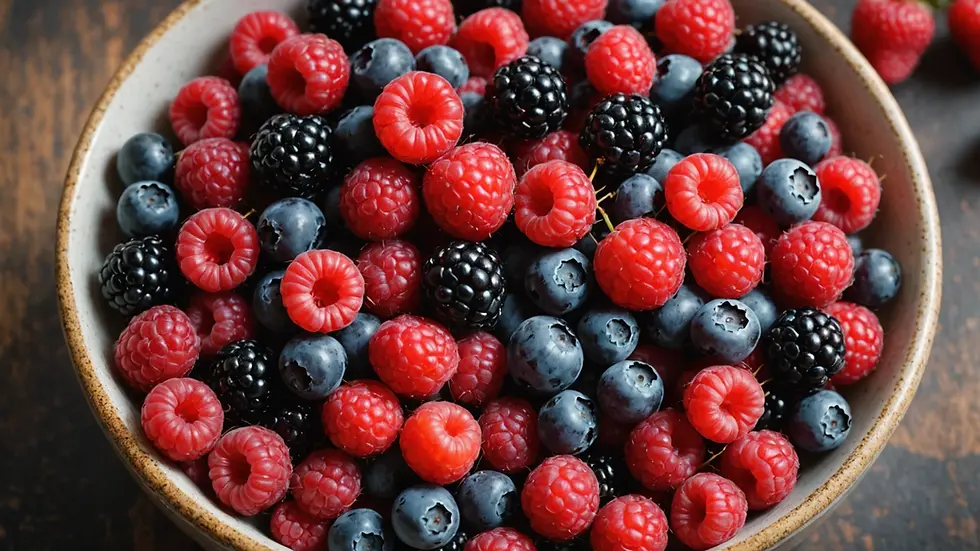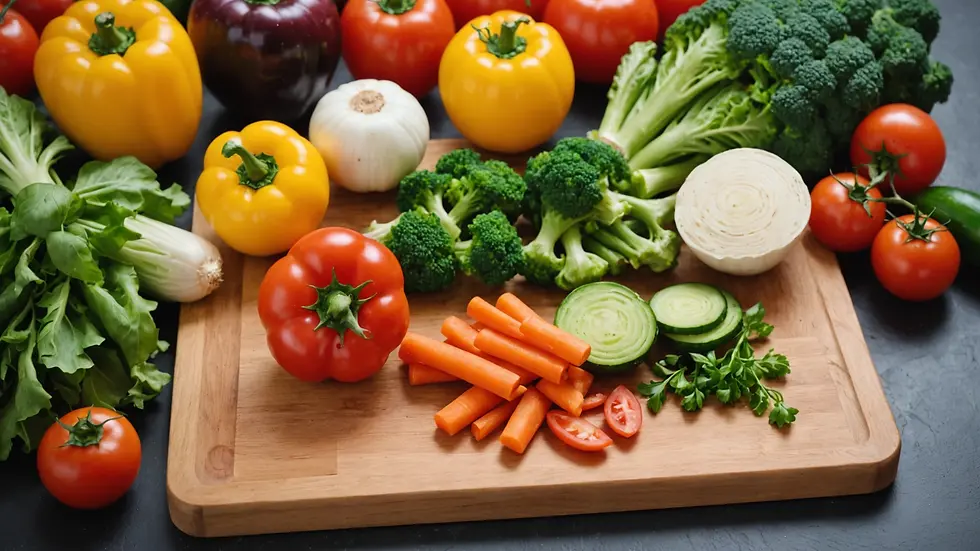Crafting a Gut-Friendly Menu: How to Feed Your Microbiome for Optimal Health
- eatwell179
- Feb 17, 2025
- 4 min read
Your gut microbiome houses trillions of microorganisms that are vital for your overall health. These tiny organisms influence everything from digestion and immune function to mood. However, many people don't know how to properly nurture their gut bacteria. This guide shows you how to customize your diet to support a thriving gut microbiome, which can lead to enhanced health and vitality.
Understanding the Microbiome
The gut microbiome includes bacteria, viruses, fungi, and other microbes residing in your digestive tract. Each person's microbiome is unique, shaped by diet, lifestyle, and genetics. Research indicates that a diverse microbiome is linked to better health outcomes, including a 30% lower risk of obesity and related diseases.
A robust microbiome aids in food breakdown and nutrient production. It also regulates the immune system. By optimizing your diet for gut health, you can achieve significant improvements in your overall well-being.
Foods to Embrace
1. Fermented Foods
Fermented foods are packed with probiotics—live bacteria that promote gut health. Adding options like yogurt, kefir, sauerkraut, kimchi, and miso to your diet can substantially enhance your microbiome. .
Try including a serving of fermented food in your meals three to four times a week. Start your day with yogurt topped with berries, or enjoy sauerkraut as a zesty side with lunch.
2. Prebiotic Fiber
While probiotics are the beneficial bacteria, prebiotics are their food. Foods high in prebiotic fiber include garlic, onions, leeks, asparagus, bananas, and oats. Adding more prebiotic foods can promote healthy bacterial growth in your gut, which has countless downstream effects on your health.
Incorporate various prebiotic-rich foods into your meals. For example, add sliced bananas to oatmeal or mix roasted garlic and other fiberous vegetables into your stir-fry.
Hydration Matters
Staying well-hydrated is crucial for a flourishing gut microbiome. Water helps transport nutrients and ensures effective digestion. Aim for half your body weight in ounces daily, adjusting as needed based on activity levels and climate. Your blood is mostly made out of water (which carries all the nutrients and oxygen to the cells in your body), and every chemical reaction within your body requires water- your muscles contracting, heart beating, food digestion- thus staying hydrated is an important aspect of health and maintaining a healthy microbiome.
Incorporate hydration into your routine by keeping a reusable water bottle nearby. You can also hydrate with herbal teas or water-rich fruits like cucumbers, which are about 95% water, or watermelon.
Balanced Diet: The Key to a Happy Gut
A balanced diet filled with whole foods is vital for your gut. Fruits, vegetables, whole grains, high quality proteins, and healthy fats nourish your body and support gut diversity. A colorful plate is not just appealing but also beneficial—darker colored fruits and veggies often boast a higher antioxidant content.
To create a gut-friendly menu, focus on a mix of foods, and a balanced plate. Explore seasonal fruits and vegetables or try recipes that use whole grains like quinoa, which is rich in fiber and protein.
The Role of Polyphenols
Polyphenols are plant compounds that promote the growth of beneficial bacteria. Foods high in polyphenols include berries, dark chocolate, green tea, and olive oil. Consuming foods rich in polyphenols can promote the establishment of microbes that contribute to a healthy mucosal barrier in the gut.
Incorporate these foods into your meals and snacks. Enjoy a cup of green tea instead of your afternoon coffee or blend a handful of berries into your smoothies for a tasty, nutritious boost.

What to Avoid
1. Highly Processed Foods
Highly processed foods pose a threat to your gut microbiome due to their high sugar, salt, and oxidized, damaged fats. These foods can encourage harmful bacteria, leading to an unhealthy microbial balance. The more you feed these "bad" microbes, the more they are able to crowd out the beneficial microbes that offer you anti-inflammatory, health supporting benefits.
Be mindful of your food choices to foster a positive change. Whenever possible, choose homemade meals made with fresh ingredients over pre-packaged options.
2. Artificial Sweeteners
While low-calorie sweeteners may seem tempting, some studies indicate that they can negatively impact gut bacteria. Instead, opt for natural sweeteners like honey or pure maple syrup in moderation (less than 20g added sugar daily). Switching to natural sweeteners not only makes your meals delicious but also supports a healthier gut environment.
The Importance of Variety
Dietary diversity is vital for a thriving gut microbiome. Regularly changing your food selections can introduce a range of bacterial strains, enhancing overall gut health. Diversity in your diet can decrease the risk of dysbiosis—the imbalance of good to bad gut bacteria.
Consider meal prepping different cuisines each week or incorporating new fruits and vegetables. Not only will this keep your meals exciting, but it also encourages exploration and discovery of new favorites.
Mindful Eating Practices
How you eat is just as crucial as what you eat. Practicing mindful eating—such as eating slowly, savoring each bite, and minimizing distractions during meals—can improve digestion and enhance the enjoyment of food. This practice allows the brain to communicate via the vagus nerve to your digestive organs that it's time to prepare for digestion.
Set aside time for meals, focusing on the flavors and textures of your food. This practice enhances both satisfaction and digestion, allowing you to enjoy your meals fully.
Embracing Gut Health Through Nutrition
Caring for your gut microbiome through thoughtful nutrition has countless positive side effects for your health. By choosing nutrient-dense foods, increasing your intake of probiotics and prebiotics, and embracing mindful eating, you can significantly improve your gut health and overall wellness.
Remember, small changes lead to big results. Start by integrating different foods into your diet, sharing meals with friends and family, and savoring the process of creating a gut-friendly menu. Your gut will be grateful!


Comments